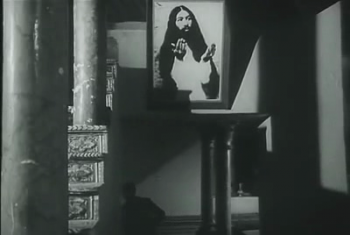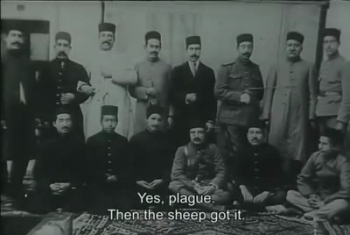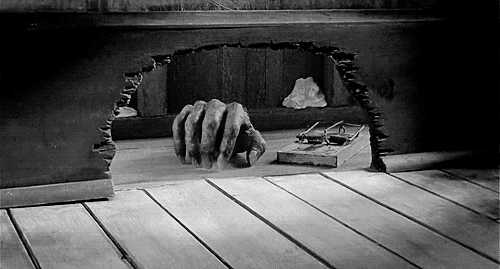- AÑO 1972
DURACIÓN 107 min.
PAÍS Irán
IDIOMA Farsi
DIRECTOR Dariush Mehrjui
GUIÓN Dariush Mehrjui (Obra: Georg Büchner)
MÚSICA Hormouz Farhat
FOTOGRAFÍA Houshang Baharlou (B&W)
REPARTO Ali Nassirian, Ezzatolah Entezami, Jaleh Sam, Ahmad Reza Ahmadi, Bahman Fersi, Esmat Safavi, Ezatallah Ramezanifar, Amrollah Saberi, Iraj Rad
PRODUCTORA Studio Missaghieh
- The Mailman (Postschi)
This film firmly establishes as a major talent the Iranian Mehrjui, whose successful fusing of pathos, humor, and preoccupation with the poor resembles nothing less than Chaplin or early De Sica in its ferocity. In his earlier The Cow, the only owner of such a precious animal in a poverty-stricken village goes insane over its loss and assumes its place; berserk, he is put into a harness, is dragged off to a nearby hospital, beaten like an animal, and finally dies the death of a beast in a mudhole. The Mailman is an unforgettable Wozzeck-like figure, the eternal simple-minded victim who finally rises to mistaken grandeur in a murderous gesture that leaves him braying with despair over the body of his victim. Since such films can never be popular, they are living proof of the fact that box-office returns must not be allowed to determine the life of a work of art.
AMOS VOGEL: Film as a Subversive Art. Random House, 1976. Disponible en: DivX Clásico.
***
- Carrera de la Película temprana 1966-1972
En la película, Nassirian juega a Taghi, un funcionario miserable cuyas espirales de la vida en el caos. Gasta sus días como un cartero infeliz y tiene dos empleos de noche a fin de pagar sus deudas. Su miseria ha causado la impotencia y es experimentado con por un herbolario aficionado que es uno de sus empleadores. Su única esperanza ingenua consiste en que ganará la lotería nacional. Cuando descubre que su esposa es la amante de terrateniente más rico de su ciudad, fugas de Taghi al bosque local donde experimenta un breve momento de paz y armonía. Su esposa viene buscándole, y en un ataque de rabia Taghi la asesina y finalmente se agarra para su delito.
Postchi afrontó las mismas cuestiones de censura que Gaav, pero finalmente se liberó en 1972. Se protegió en Irán en el 1er Tehrán Festival de cine Internacional y en el Festival de cine Sepas. Internacionalmente se protegió en el Festival de cine de Venecia, donde recibió una mención especial, el 22do Berlín Festival de cine Internacional, donde recibió el Premio de la Interpelícula, y 1972 Festival de cine de Cannes, donde se protegió como la parte de la Quincena de los Directores.
Fuente: traducción automática que aparece en knowledger.de
***
Copia VOSI de KaraGarga emulizada por serdar002 en Cine-Clásico...
Código: Seleccionar todo
Format : AVI
Format/Info : Audio Video Interleave
File size : 690 MiB
Duration : 1h 44mn
Overall bit rate : 927 Kbps
Writing application : MEncoder Sherpya-SVN-r27811-4.2.5
Writing library : MPlayer
Video
ID : 0
Format : MPEG-4 Visual
Format profile : Simple@L1
Format settings, BVOP : No
Format settings, QPel : No
Format settings, GMC : No warppoints
Format settings, Matrix : Default (H.263)
Codec ID : FMP4
Duration : 1h 44mn
Bit rate : 797 Kbps
Width : 400 pixels
Height : 268 pixels
Display aspect ratio : 1.493
Frame rate : 25.000 fps
Resolution : 24 bits
Colorimetry : 4:2:0
Scan type : Progressive
Bits/(Pixel*Frame) : 0.297
Stream size : 594 MiB (86%)
Writing library : Lavc52.0.0
Audio
ID : 1
Format : MPEG Audio
Format version : Version 1
Format profile : Layer 3
Codec ID : 55
Codec ID/Hint : MP3
Duration : 1h 44mn
Bit rate mode : Variable
Bit rate : 117 Kbps
Channel(s) : 2 channels
Sampling rate : 44.1 KHz
Resolution : 16 bits
Stream size : 87.0 MiB (13%)
Alignment : Aligned on interleaves
Interleave, duration : 26 ms (0.65 video frame)
Interleave, preload duration : 392 ms Enlace
Subtítulos
Subtítulos en inglés incrustados en la imagen.





